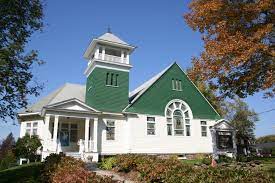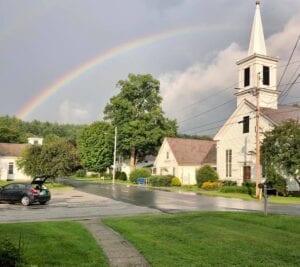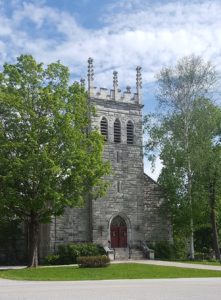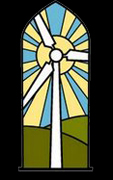VERMONT INTERFAITH POWER & LIGHT CLIMATE ACTION GRANTS
As people of faith and conscience, we feel a sacred and moral obligation to do everything we can to reduce our contribution to the climate crisis and to inspire and mobilize others to follow our example.
To advance this mission, Vermont Interfaith Power & Light (VTIPL) has established Climate Action Grants to enable Vermont faith and spiritual communities to reduce their greenhouse gas emissions. This program is made possible by the Ellie & Harris Webster Memorial Fund, the Katy Gerke Memorial Fund, and the generosity of those who have provided financial support for these funds.
VTIPL administers these programs, distributing funds that have been donated for this purpose and are not a part of our operating budget. Our operating costs are entirely dependent on donations from faith communities and people of conscious.
Climate Action Grants provide matching grants to faith and spiritual communities in Vermont and twelve (12) New Hampshire towns.* These matching grants are available to enable faith and spiritual communities to:
• Obtain professional energy audits of their facilities,
• Implement energy efficiency improvements based on the energy audit results,
• Implement renewable energy projects to reduce fossil fuel use,
• Non-building related projects that reduce greenhouse gas emissions, such as tree planting, electric vehicle charging station, soil regeneration, etc.
The Katy Gerke Memorial Fund (KGMF)
The KGMF was established by Paul Gerke to honor his late wife, Katy Gerke. Katy was an active member of Saint Michael’s Episcopal Church in Toledo, Ohio and the Norwich Vermont Congregational Church. She was a woman of remarkable energy, a world traveler, an amateur French cook, a lover of literature and opera and a practicing radiologist. She wanted to leave the world a better place and she made it clear by action and word that her family was the most important thing in her life.
*Towns in New Hampshire: Bath, Charleston, Claremont, Cornish, Hanover, Haverhill, Lebanon, Lyme, New London, Oxford, Piermont and Plainfield
The Ellie & Harris Webster Memorial Fund (E&HWMF)
The E&HWMF was established by VTIPL Board member Harris Webster to honor his late wife, Ellie Cressey Webster. Ellie was a long time member of the Unitarian Church of Montpelier, VT and played an active role in weatherizing its building and pursuing efforts to reduce its greenhouse gas emissions. According to Harris, she was a doer who was very much aware of the challenges to our Earth’s ecosystems and to achieving social justice.
In 2025, following the death of Harris Webster, the VTIPL Board decided to change the name of this fund to honor the involvement, advocacy, and contributions Harris has made as a board member to our work.
CLIMATE ACTION GRANT APPLICATIONS
The Climate Action Grants Program has been established to honor the memory of Katy Gerke, Ellie Webster, and Harris Webster and to help faith and spiritual communities in Vermont and in twelve New Hampshire towns* improve the energy efficiency of their buildings and reduce their greenhouse gas emissions. Funds from this program can be used by faith and spiritual communities to obtain professional energy audits of their buildings and to then undertake projects that will reduce their greenhouse gas emissions. All grants will require that faith and spiritual communities provide matching funds for each grant request.
The on-line and printable applications for Climate Action Grants are below:
- Application for Climate Action Energy Audit Grant
- Application for Climate Action Energy Efficiency Project Grant
- Application for Climate Action Renewable Energy Project Grant
- Application for Non-Building-Related Project that Reduces Greenhouse Gas Emissions
Climate Action Grants at Work
“A ‘Cool’ Success Story”
by Sam Swanson, Ascension Lutheran congregant and VTIPL Board Treasurer
Earlier this year, Ascension Lutheran Church in South Burlington found we would need to upgrade air-conditioning in part of the church building to meet the needs of the Old School program (a nature-based preschool) that operates at the church. The two existing window air-conditioners did not meet state regulation for such a preschool program. The Church decided these improvements could best be accomplished by installing two heat pump units, which would have the additional benefit of enabling us to reduce the use of natural gas for heating the church in the winter. However, the church budget could not provide the $40,000 needed to install the heat pump systems. To move forward with the project, Ascension Lutheran split the project into two phases, each costing about $20,000. We then applied for a VTIPL Climate Action Program matching grant in the amount of $10,000 to cover half the cost of the first phase, and appealed to the congregation for donations to cover the remaining $10,000. The subsequent fundraising program--launched with the VTIPL seed funding--succeeded in not only obtaining $10,000 for the first phase, but raised an additional $20,000, enabling us to fund both phases of the heat pump installation.Thank you to the generous community of Ascension Lutheran and to VTIPL for making this project a success!
First Unitarian Universalist Church of Hartland
Prior to the winter of 2022-2023 the First Unitarian Universalist Church of Hartland applied to VTIPL for a Climate Action Grant to install cold-climate heat pumps in their Fellowship Hall. Their goal was to replace the oil-fired furnace that heated this space. They were awarded a grant from the Ellie & Harris Webster Memorial Fund to help with the installation of two(2) heat pumps and a back-up propane wall furnace. At the conclusion of the winter of 2022-2023, they reported that the back-up propane wall furnace never came on during the winter and the old oil-fired furnace was removed.
Richmond Congregational Church

The Richmond Congregational Church has undertaken a multi-year plan to maintain their building, reduce their energy use and improve comfort within the building. Projects undertaken to date include:
- New roof with high quality, long-life, shingles and copper sheathing on the roof of the steeple
- Electrical upgrades to add outlets and lighting
- Improvements to make the kitchen easier to clean and consequently more hygienic; and, an energy efficient dishwasher with help from a grant from Efficiency Vermont.
And, a major project has been air sealing and adding insulation. Thanks to grants from Vermont Gas and Vermont Interfaith Power and Light (Katy Gerke Memorial Program), insulation over the altar, parlor, vestibule, offices and classrooms and improved air sealing and insulation on the attic access hatches, there has been a 40% reduction in air infiltration. Not only will this lower energy bills, but it will also make the church less drafty in the winter and cooler in the summer.
Projects Planned for 2021:
- Replacing windows in the offices. Parlor and school rooms
- Handicap ramp to alter
Projects planned for 2022:
- Parlor
- Interior painting
- Church Street entrance
- Carpeting
- Sanctuary lighting
- Heat pumps for heating/cooling of offices
Answers to VTIPL questions:
- Why did your faith community implement energy efficiency measures? We knew we needed to address some deferred maintenance to keep our building in good shape and to aim toward more sustainability, but in terms of energy efficiency as well as other lower costs. The roof for example we spend more than we had planned to have it be something that would last much longer than a standard 20-25yr life. This was important both from a future cost, avoidance of future work as well as less roofing going into landfill in the future.
- What obstacles did you experience? -and- How did you address them? It took us several years to plan and launch a capital campaign to get the funding. The largest obstacles were defining the scope of work, getting realistic quotes and then the fundraising.
- Have you experienced energy savings? -and- If yes, how much? (No need for an analysis, a ballpark estimate is OK) Let me see what I can find, I know we spent less on fuel this last winter, I think it was on the order of 20%.
The Federated Church of East Arlington, Vermont
We recently asked Alyson Ruby Grzyb, a member of the Federated Church of East Arlington about their efforts to save energy and to reduce the carbon emissions of their church building. The following are her answers to our questions:
How did you decide to proceed with your energy efficiency project? - There was a grant available through Efficiency Vermont that would allow us to do a deep energy retrofit . We thought it was the right time to do the project, knowing that a big portion of it would be covered and that it would reduce our energy costs for the coming years. To further save on out of pocket costs we utilized the VT Interfaith Power and Light grant to mostly cover the costs of new LED light bulbs for the sanctuary and gathering hall of the church building.
What obstacles did you have to overcome, and how did you overcome them? - The grant was spread out over a couple years so there was a fairly significant upfront cost that then got mostly paid back over the course of the next two years. We had some savings that we were able to use for those upfront costs and felt that the long-term effect of energy savings would be worth it.

Can you share information about changes in your energy use following the project? - Although our energy savings were not as significant as we had hoped for (we were hoping for a 50% or more decrease in energy costs) we did still have savings (more like 30-40% decrease in energy costs) that have continued over the years.
Have you undertaken any additional energy efficiency projects? If yes, can you share what you've done? - We have not undertaken any additional energy efficiency projects since that time.
The rest of their story:
In 2016 the church replaced two (2) old propane boilers and an electric hot water heater with one (1) high-efficiency propane boiler and a heat pump water heater. These new appliances were great, but the building was still poorly insulated, so this new equipment couldn’t live up to its potential in terms of energy savings.
In the spring of 2017 the church applied for and was accepted to be part of a Deep Energy Retrofit Pilot program through Efficiency Vermont. Through this pilot program the attic and basement areas of the church were weather-sealed and the level of insulation was significantly increased.
At the same time as this pilot program, the church applied for a matching grant from Vermont Interfaith Power and Light through the Katy Gerke Memorial Program. We were approved for the grant which was used to upgrade all of the lighting in the sanctuary and parish hall with energy efficient LED lighting.
By performing these energy efficiency improvements the church has been able to reduce its energy useage, and thus energy costs by approximately 40%. These improvements have also reduced our carbon emissions and to manifest our caring for Creation.
United Church of Dorset & East Rupert
One example of a Vermont faith community that has used the Katy Gerke Memorial Program to take actions to address the climate crisis and the threat it presents to Creation is the United Church of Dorset & East Rupert.
The Green Team at the United Church of Dorset & East Rupert
Founded in 1784 the Dorset Church, now the United Church of Dorset & East Rupert, has a history of almost 250 years of spiritual commitment to its community and to Creation. Now, with its active Green Team it’s preparing for its members and their grandchildren through its commitment to reducing its carbon emissions.
Originally heated with locally cut wood, the church at some point switched to heating with fuel oil. Recognizing their commitment to Creation and the negative effects of burning fossil fuel, the Green Team’s purpose is to reduce their church’s carbon emissions while also saving money. To pursue this the Green Team has lead the congregation in making the following changes:
- Replacing the oil-fired water heater with an energy efficient heat pump water heater.
- Installing cold-climate heat pumps to heat their administrative rooms
- Installing a cold climate heat pump to heat/cool the sanctuary
- Installing programmable thermostats when the heat pumps were installed.
A portion of the cost for these changes was provided by a grant from Vermont Interfaith Power and Light, www.VTIPL.org.
These changes have enabled them to reduce their heating fuel use by approximately 50%. And, although their electricity use has almost tripled, all of their electricity is clean, renewable solar generated. They’ve met their immediate goal of reducing their carbon emissions while saving money.
These are not the first things the Green Team has undertaken to reduce their energy use and carbon emissions. In 2013 they had an energy audit done with help from a Vermont Interfaith Power and Light grant and had weatherization and air sealing done. The also switched their incandescent lights to LEDs and in 2016 replaced fluorescent fixtures with LEDs.
Until COVID took over, they were running a van- pool once a month to take parishioners and neighbors to Aldi’s in Bennington for grocery shopping. It was a boon to some who were not confident about driving and certainly a gas saver. Each chipped in $2 for gas and had a good time to boot. They look forward to resuming and perhaps expanding this service.
But, the Green Team is not done. Future plans call for further reducing their heating oil use for the Sunday School rooms, the Pastor’s study and the Vestry. They’re also looking at the manse, which is heated by oil, and they’re discussing carbon-free transportation, composting and “natural burials.
The Green Team at the United Church of Dorset & East Rupert has made a meaningful commitment to Creation and is continuing to look for ways to further that commitment.

